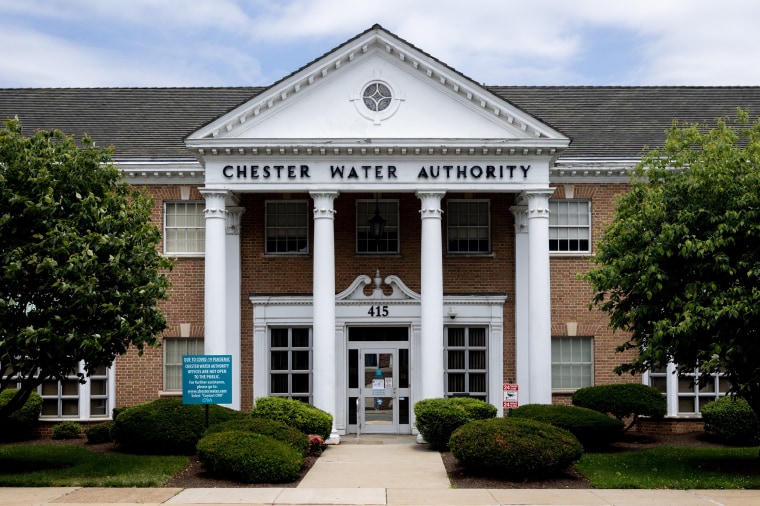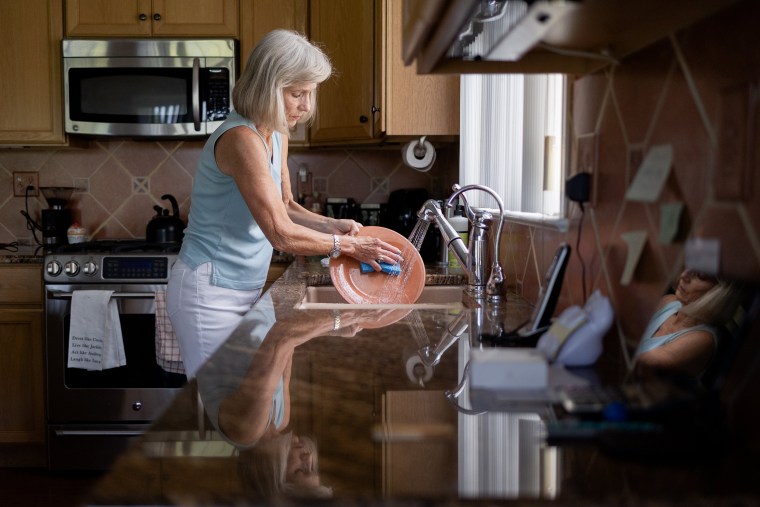When Margo Woodacre opened her sewage bill in April, she did a double take. Her latest charges jumped 42 percent, to $37 per 1,000 gallons from $26 per 1,000 gallons. That was a major hit on the budget of the 71-year-old retired social worker who lives in Landenberg, Pennsylvania.
But she told NBC News she’s worried the rate hikes have just started. In 2017, her cash-strapped township of New Garden accepted a bid to sell off its sewer system for $29 million to a private investor-owned company called Aqua. But as part of the sale, Aqua could continue to increase rates by as much as 51 percent, with the utility commission’s approval, according to the agreement between Aqua and New Garden Township. Now, Aqua has set its sights on buying out the Chester Water Authority, the utility that serves Woodacre’s neighborhood with drinking water, which would raise her bills even more.
“My community — we’re all on fixed income. So obviously we are concerned about rates. We need water,” said Woodacre, who has been organizing against the privatization of the water system. “It’s about not having control as a rate-paying customer.”

The water business has been a booming investment for private companies. Over the last couple of decades, private water companies have steadily increased their market share of water systems to 15 percent from 10 percent, largely by taking advantage of state legislative efforts that have changed how public assets are valued, said Heike Doerr, a water utilities analyst with S&P Global Market Intelligence. In the past, the value of a public utility was measured by its “book value,” which factors in its depreciating value — like a car. But since 2016, 14 states have passed “fair market” legislation, which allows companies to factor in the future value of a utility, pay above this price and then pass along those costs to consumers.
The Chester Water Authority acquisition is just one of 28 pending water and wastewater purchases across 11 states with a combined value of $787 million, according to S&P Global Market Intelligence. As the country’s water infrastructure ages and cities fall deeper into financial distress, selling to a private company can be appealing. Cities and towns can relieve themselves of the burden of running a rusty water system while using the profits from the sale to pay off debts or improve parks and schools, Doerr said.
New Garden Township Solicitor Vince Pompo said in an email that the township had sold the sewer system because it “was aging infrastructure which was predicted to require fairly significant further rate increases of its own.” The township plans to use the sale profits to clean and develop public parks and improve streets in one of its villages.
Colleen Arnold, president of Aqua, said in an email that fair market laws allow Aqua and other private utility companies to leverage their expertise and operations to benefit both customers and cities to provide testing and safe and reliable service.
But, in many cases, residents are left to pay rates they never agreed to.
“Talking about those rates popping, we’re talking about a dishwasher or a car repair bill,” said Catherine Miller, an Oxford, Pennsylvania, resident and organizer with the volunteer group Save Chester Water Authority. “That is real money for people.”
Eager buyers
As soon as Pennsylvania passed a fair market bill in 2016, the country’s largest privatized water companies, Essential Utilities and American Water, took aim at the state’s water systems, snapping up assets for millions of dollars. In 2017, Chester Water Authority became a target of a $320 million acquisition by Aqua, which is owned by Essential Utilities. Typically, towns and cities with crumbling water systems are identified for acquisition because they may not have the budget to improve their infrastructure or the expertise to efficiently run a water utility, Doerr said. A 2018 report from the U.S. Environmental Protection Agency estimates that the country’s public water system needs $472.6 billion in infrastructure investment over the next two decades.

“Every year that infrastructure gets older, the need to replace it is heightened,” Doerr said.
But some residents and potential customers of these private companies disagree that privatization is the answer to meet this need.
Chester Water Authority, which serves 43,000 customers in southern Chester County, western Delaware County and the city of Chester, is pushing back at the water privatization movement along with some customers. It has argued in court that it is not in distress and is not owned by the city. The authority said in a 2019 court petition for trustee status that it has met or exceeded federal and state water safety requirements as well as those established by the American Water Works Association, an international nonprofit, scientific and educational water quality organization. It also claimed that it has not been owned by the city since 2012 and is seeking trustee status to establish ratepayers as the owners of the utility. The water authority accuses Chester city of claiming ownership to be able to sell the water system to Aqua and crawl out of financial distress.
“Aqua’s offer was a proposed monetization of the Authority’s assets, which could purportedly provide the City with the quick cash it needed to possibly exit [financial distress] and allow Aqua and its shareholders to benefit significantly over the long-term,” the water authority wrote. “In exchange, and despite an illusory rate freeze, the authority’s ratepayers would receive increased water charges in perpetuity.”
None of these problems are new for Chester. Since 1995, the city has been in financial distress after decades of deindustrialization and population loss. By 2017, it accumulated $28 million in debt. Because of its status as a financially distressed city, the state’s Department of Community and Economic Development ordered Chester to address its funding deficits. Aqua made an offer to buy Chester Water Authority in 2017 and Chester city considered the offer, claiming it owned the water utility.
Chester Mayor Thaddeus Kirkland said in an interview that if the court decides the city is the owner of the water system, it would avoid any sale to a company that would raise rates.
“We’ve been open to discussions with everyone and have been in discussion with everyone,” he said. “Whatever we do, we hope to do in the best interest for the constituents of our city.”
A court hearing was held at the Pennsylvania Commonwealth Court in November to determine whether Chester has the right to dissolve the water utility, which would mean it could sell it to a private company. The court is expected to release a decision soon.

In the meantime, for a company like Essential Utilities, all of these potential deals mean big business.
In 2020, the company closed six transactions and ended the year with roughly 700,000 new customers, amounting to a total of nearly 1.8 million households and $1.4 billion in operating revenue, Essential Utilities CEO Christopher Franklin told investors in May. Although President Joe Biden’s infrastructure plan proposes $111 billion toward improving water systems, Franklin anticipates that it will be a drop in the bucket, leaving plenty of room for private investment.
“The need is so vast in that area that it will barely touch the total need,” he said during the shareholders call. “There is still a tremendous opportunity for companies like ours to play a critical role in solving the infrastructure needs of the country and bring private capital to bear.”
Companies such as Essential Utilities and American Water, the largest investor-owned water company in the U.S., serving 15 million people across 46 states, increase their earnings by investing money in updating infrastructure, said Doerr, the utilities analyst. As they expand their number of ratepayers, these companies spread the cost of investments across a broader group and ultimately lower the cost, she said.
“As future infrastructure investments move along, you’re not seeing a lumpy rate increase as a result of a project,” said Doerr.
But until those rate increases are spread more evenly, these sales continue to worry consumer advocates. Ratepayers pay roughly 59 percent more for water under privatized systems than government-owned utilities, and capital financing costs can be as much as 150 percent higher, according to Food & Water Watch, a nongovernmental group that focuses on food and water issues.
“You want to be cautious about whether it's in the public interest,” said Janice Beecher, director of the Institute of Public Utilities at Michigan State University. “There are a whole bunch of concerns here about what the impact will ultimately be on customers.”
American Water rates are higher than public systems in some cases because public owners “have not made adequate, ongoing investments in their infrastructure,” whereas the company makes those investments that could hike rates, said Ruben Rodriguez, a spokesperson for the company.
“Our approach is to proactively make system investments to improve reliability and resiliency, while reducing the risk of service issues or water quality problems later,” he said.
Arnold with Aqua said that its use of economies of scale and operational efficiencies allows it to fund infrastructure projects across its business. She said the company is accountable to Pennsylvania licensing authorities, public utility commissions and customers.
“Our customers can continue to count on us to maintain their local infrastructure, operate with excellence and prioritize their well-being and environmental stewardship in everything we do,” she said.
National issue
Privatizing water systems has become a contentious issue across the country, not just in Pennsylvania. Bryan McDaniel, director of governmental affairs with the nonprofit consumer advocacy group Citizen Utility Board, has been working in Illinois to pass a state bill introduced in February that would require a vote among citizens before their city or village sells a public water system to a private company. Since 2013, Illinois American and Aqua America have acquired 34 water or wastewater systems across the state and have collectively charged customers more than $220 million to cover the acquisition costs, according to a Citizen Utility Board analysis of Illinois Commerce Commission data.
“Water is a building block for life,” he said. “So why are we going to put corporations between us and something we need for life?”
Arnold with Aqua told NBC News that all of its acquisitions go through a transparent process through the Illinois Commerce Commission.
But in addition to complaints about rising prices, some private companies have also been accused of cutting corners on quality and maintenance to allow for that layer of profit. In 2019, Illinois Attorney General Kwame Raoul and Will County State’s Attorney James Glasgow filed a lawsuit against Aqua’s Illinois business accusing the company of switching its University Village water source from groundwater wells to the Kankakee River without acquiring a permit. When consumers complained about the taste, the company allegedly added a phosphate mix to the water that caused housing pipes to degrade, releasing lead, according to the lawsuit filed with the Will County Circuit Court. The Illinois EPA found that University Village residents tested for high levels of lead in their water.
While research is still being done on the change in water chemistry, Aqua told NBC News there is not lead in the infrastructure or Kankakee River source water, but there is lead in some homes’ internal plumbing and faucet fixtures. Arnold with Aqua added in an emailed statement that the company was under the complete oversight of the Illinois Environmental Protection Agency and received approval on all permits for its work in University Village. She said the company did more testing than what was required by state and federal law and experts believe this situation could not have been predicted. Since the summer of 2019, the company has been supplying the community with water bottles and water filtration systems.
“Once you sell or lease this infrastructure over to a private company, you’ve pretty much lost all local control,” said Nick Hartman, vice president of AFSCME Local 988, the union for municipal workers who oppose water privatization in the state. “If a citizen has a problem, they’re dealing with the city, and if they feel the problem is not solved through the staff, they have an elected official to go through. But private companies don’t have that.”
Local impact
For Woodacre, she hopes her drinking water bill remains untouched. As residents wait for a decision from the judge, Woodacre said she’s been knocking on doors in her community talking with neighbors about how Aqua might hike rates after the buyout.

“If Aqua owns both (the sewage and water companies), we’ll have rates raised,” she said. “We hold our breath every time we open a bill.”
CORRECTION: (June 22, 2021 3:12 p.m. ET) A previous version of this article misstated the findings of the Illinois EPA. It found high lead levels in the water supply, not in the blood of University Village residents. In addition, the article imprecisely described Aqua’s ability to raise rates, omitting the need to get the approval of the utility commission before a rate hike. The article was also updated to include additional comment from Aqua that there is not lead in the infrastructure or Kankakee River source water, but there is lead in some homes’ internal plumbing and faucet fixtures.
